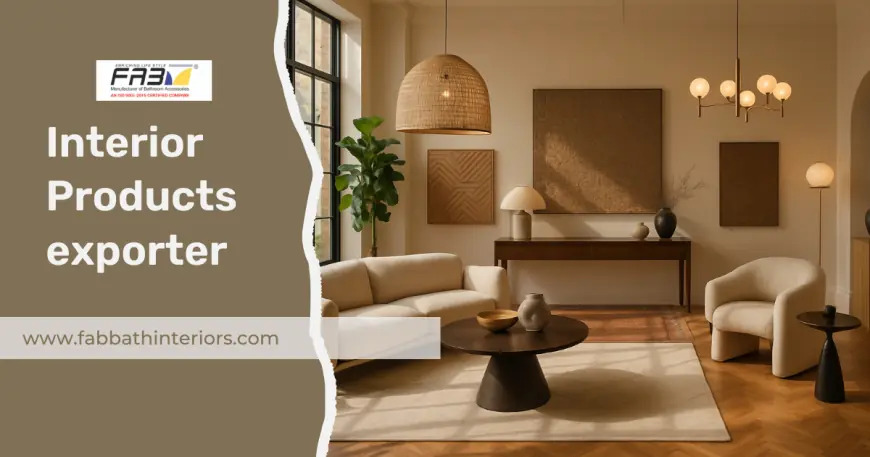Interior Products Exporter: The Gateway to Global Style and Quality
bathroom interior

In the fast-paced world of design and architecture, the right interior elements can transform spaces from plain to breathtaking. But for businesses and designers working across borders, sourcing these products isn’t always straightforward. This is where an Interior Products exporter becomes an essential partner—bridging design trends, quality craftsmanship, and global supply.
Whether you’re outfitting luxury hotels, modern offices, or residential developments, an experienced interior products exporter can connect you with the best in décor, furniture, lighting, and more—delivered right to your market.
What Is an Interior Products Exporter?
An Interior Products exporter is a business that sources, consolidates, and ships interior design products from one country to clients in another. They act as a supply chain link between manufacturers and overseas buyers.
These exporters specialize in a wide variety of products, including:
-
Furniture – sofas, dining tables, office desks, modular seating
-
Lighting – chandeliers, pendant lights, LED fixtures, wall sconces
-
Home décor – rugs, mirrors, artwork, curtains
-
Architectural elements – wall panels, flooring, tiles, moldings
-
Kitchen & bath fittings – cabinets, sinks, faucets, countertops
By working with an established exporter, buyers gain access to:
-
A curated selection of high-quality products
-
Cost efficiency through bulk procurement
-
Custom manufacturing options for bespoke projects
-
Logistical support including packaging, shipping, and customs clearance
Why Work with an Interior Products Exporter?
Choosing the right interior products exporter can mean the difference between project success and costly delays. The benefits go beyond just getting goods overseas—they include strategic value in design, sourcing, and supply chain management.
1. Access to Global Design Trends
Exporters often have deep market knowledge, enabling them to offer products that align with the latest interior design styles—from minimalist Scandinavian lines to intricate handcrafted Indian woodwork.
2. Quality Assurance
Reputable exporters work only with vetted manufacturers. This ensures consistency in quality, materials, and finishes, which is especially important for high-end projects.
3. End-to-End Logistics
International shipping involves documentation, customs compliance, and packaging to protect delicate products. Exporters handle these steps so clients can focus on design and installation.
4. Competitive Pricing
Through bulk sourcing and strong supplier relationships, exporters can secure better prices—helping you meet budget targets without compromising quality.
Pro tip: Always request samples or a product catalog before placing bulk orders to ensure the style and quality match your project vision.
Key Considerations When Choosing an Interior Products Exporter
Not all exporters operate the same way. If you’re selecting a partner, keep the following checklist in mind:
| Factor | Why It Matters | Questions to Ask |
|---|---|---|
| Product Range | Ensures you can source multiple categories from one supplier | "Do you offer furniture, lighting, and décor together?" |
| Customization | Supports unique project needs | "Can you produce bespoke designs?" |
| Quality Control | Reduces risk of defects | "Do you have inspection reports or certifications?" |
| Logistics Expertise | Prevents shipping delays | "Which shipping methods do you use?" |
| Market Experience | Indicates reliability and trend knowledge | "How long have you been exporting to my region?" |
A trustworthy exporter should also have transparent contracts, clear payment terms, and a responsive communication style.
Industries That Rely on Interior Products Exporters
The scope of an interior products exporter’s work extends across industries. Here’s where their expertise is most in demand:
-
Hospitality – Hotels, resorts, and restaurants require bulk furniture, lighting, and décor tailored to their brand aesthetics.
-
Commercial Spaces – Offices, co-working spaces, and retail outlets benefit from ergonomic furniture and design-driven fixtures.
-
Residential Development – Housing projects need coordinated interiors for kitchens, living rooms, and bedrooms.
-
Government & Public Projects – Airports, libraries, and municipal buildings require durable, functional, and aesthetically pleasing interiors.
By tapping into global suppliers through an exporter, these industries can access both mainstream and niche interior products quickly and cost-effectively.
The Future of Interior Products Export
The role of interior products exporters is evolving with technology and sustainability trends. Here are some changes shaping the industry:
-
Eco-friendly materials – Exporters are increasingly sourcing recycled, upcycled, and sustainable products to meet green building certifications.
-
Digital showrooms – Virtual reality and 3D visualization tools allow buyers to preview interiors before ordering.
-
On-demand manufacturing – Smaller, custom runs reduce waste and speed up project timelines.
-
Hybrid supply chains – Combining local sourcing with imported specialty items for efficiency.
Exporters who adapt to these trends are positioned to offer even greater value in the coming decade.
Final Thoughts
A skilled Interior Products exporter is more than a shipping agent—they’re a partner in creating stunning spaces. From sourcing the perfect statement chandelier to supplying entire hotel suites, their role blends design insight with global trade expertise.
When selecting your exporter, focus on experience, quality assurance, and communication. The right choice can give your project access to the best global designs, ensure timely delivery, and help you stay ahead in style trends.
If your next interior project demands top-tier products from around the world, finding a trusted interior products exporter could be the smartest move you make this year.

What's Your Reaction?
 Like
0
Like
0
 Dislike
0
Dislike
0
 Love
0
Love
0
 Funny
0
Funny
0
 Angry
0
Angry
0
 Sad
0
Sad
0
 Wow
0
Wow
0


















































